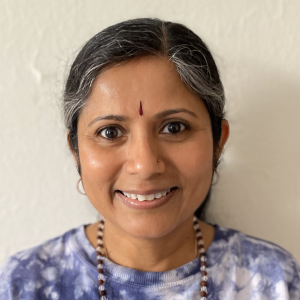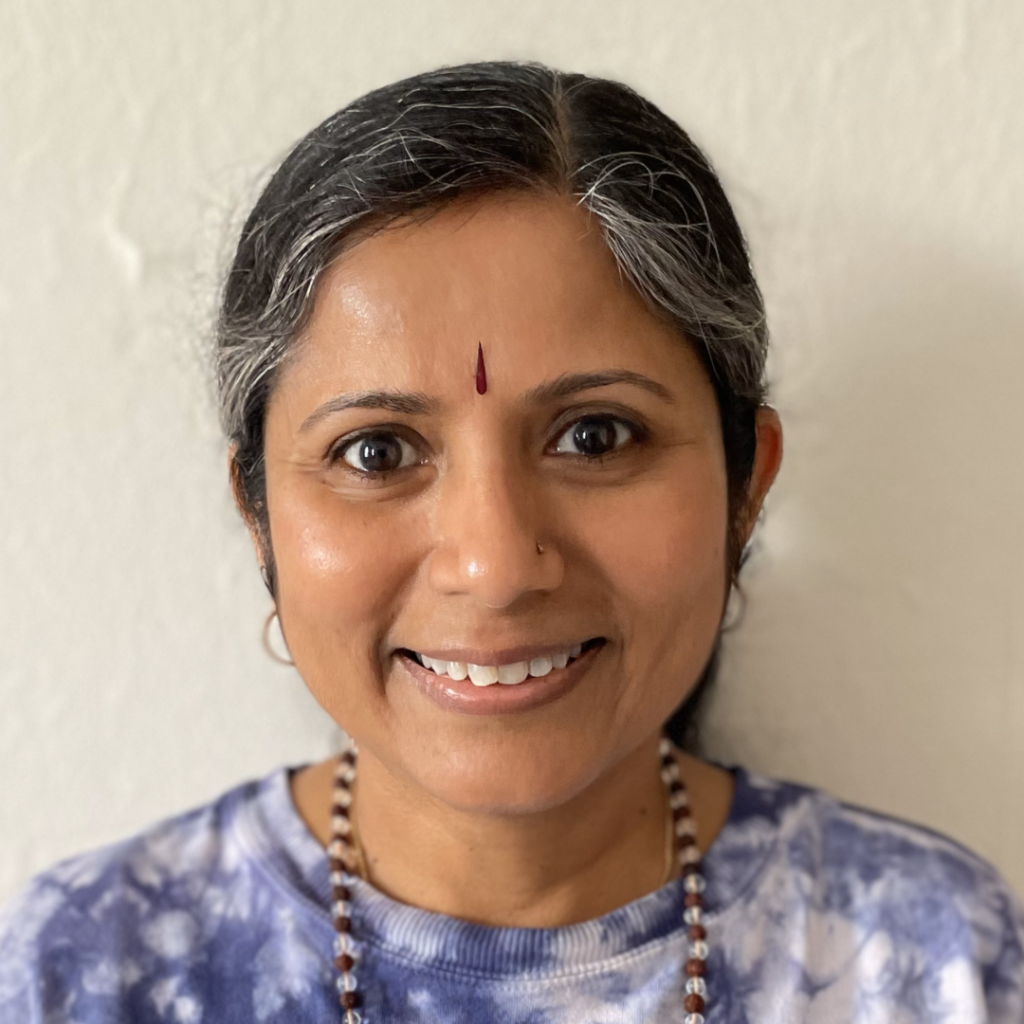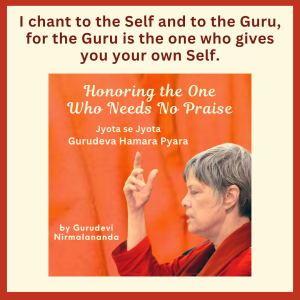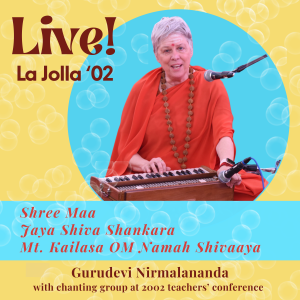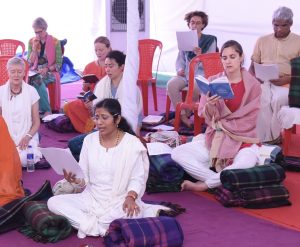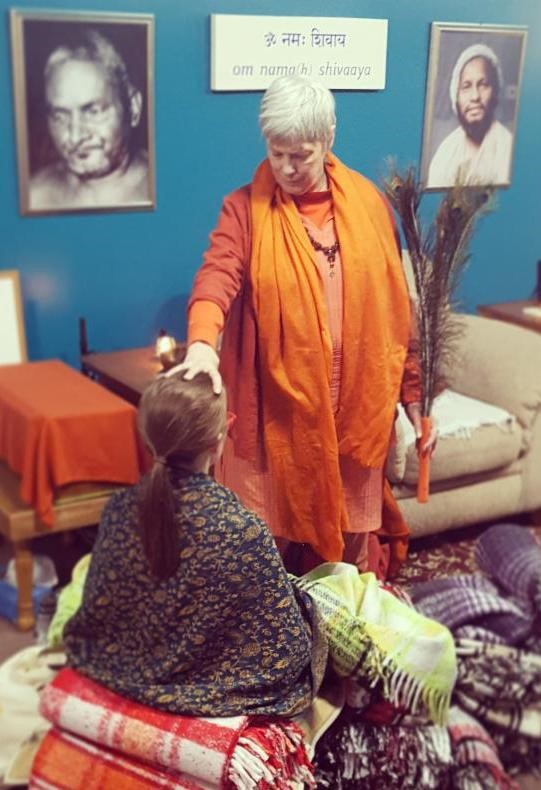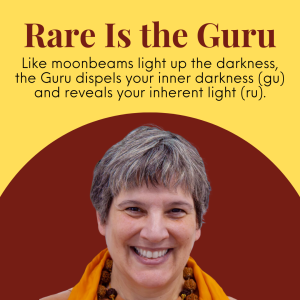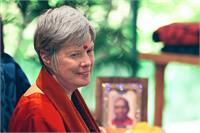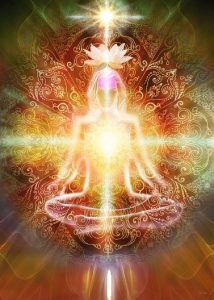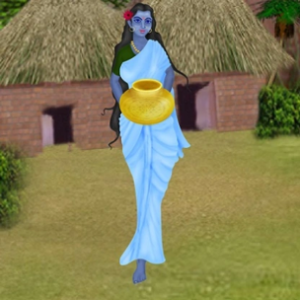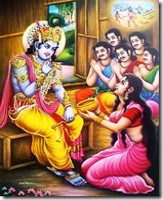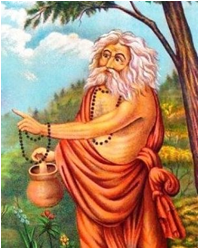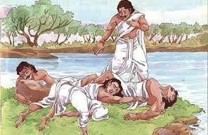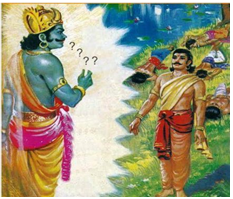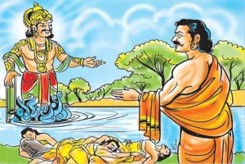By Nirooshitha Sethuram
Graphics by Sheralee (Shambhavi) Hancherow
In Hastinapura, Duryodhana was sure that it was Bhima who killed Kichaka. He wanted to invade King Virata and the Matsya Kingdom to expose the Pandavas.
Knowing if he brought that as the reason at the hall of the elders, they would never agree to attack the Matsya Kingdom. So he cunningly presented it as expanding their kingdom when the Matsya Kingdom was weak without its protector, Kichaka. His plan worked and the decision was made to attack King Virata.

At that point, Susharma, Duryodhana’s friend and the ruler of Triart was with them in the hall, visiting them. He was willing to help with the attack and requested half of Matsya Kingdom after conquering it. As Duryodhana’s goal was to discover the Pandavas, he would take anyone’s help at that point, so he agreed to it. The plan was for Susharma to attack King Virata from the south and for Duryodhana to attack from the north.
The next day, the day before the end of the Pandavas’ incognito, Susharma attacked the Matsya Kingdom from the south and was advancing very fast. Without Kichaka, King Virata felt helpless and afraid.
But Kanka assured his help to the king, saying he knew a few others who could help him in the war: Vallabha, Dhamagranthi, and Tantripala, the other Pandavas, except for Brihannala as he was in disguise as a eunuch. Trusting Kanka, as he had been a trustworthy companion for the past year, the king ordered chariots to be given to the four of them.
The four brothers joined King Virata and his army to engage Susharma in the south of the kingdom. Susharma never expected such stiff resistance from the Matsya army, after they had lost Kichaka. Fierce battle broke out.

Susharma played a trick and captured King Virata. When the Matsya army came to know of the capture of their king, they were disorganized and lost heart. Kanka called on Vallabha and told him to recoup the army and recover King Virata. Vallabha gained control of the disorganized Matsya army and attacked Susharma.
King Virata was tied to Susharma’s chariot. From a far distance, Vallabha broke the chariot. Both Susharma and King Virata fell on the ground. King Virata reaped full advantage of the situation by snatching the sword from Susharma and fighting the enemy ranks, making his way back to his own army. After which Vallabha defeated Susharma’s army.
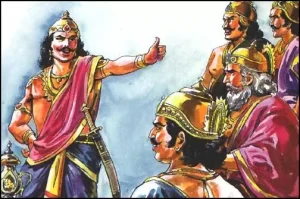
Susharma fled the battlefield, but was captured by Vallabha in no time. When Vallabha was going to behead Susharma, Kanka intervened and set him free with a warning. No one from Susharma’s army recognized Yudhishthira and his three brothers, not being familiar with them because their kingdom of Triart was far away.
While the four brothers, King Virata and his army were in the south, Duryodhana attacked the Matsya Kingdom from the north. It was the last day of the Pandavas’ incognito. When news of the attack came to the palace, only the young prince Uttara was in the palace with his mother, Sudeshna. Though Uttara, no doubt, was a brave prince, he didn’t have a charioteer.
As prince Uttara and Queen Sudeshna discussed the matter, Sairandhri suggested getting help from Brihannala, as she had seen Brihannala being a charioteer to Arjuna in the past. Though Uttara didn’t fancy a eunuch being his charioteer, hard situations needed hard decisions so Uttara requested Brihannala to be his charioteer.
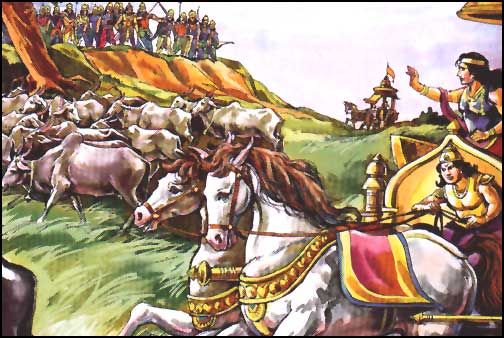
With blessings from his mother, Queen Sudeshna, prince Uttara and Brihannala went to the north to meet Duryodhana’s army, which included Grandsire Bhishma, Guru Drona, Kripacharya, Karna, Dushasana and Ashwatthama. Karna was on a rampage. His army had already captured a vast territory and thousands of milk cows in the process.
When prince Uttara and Brihannala reached the battlefield, seeing the great army of Hastinapura, prince Uttara got cold feet. And rightfully so, as he saw some of the greatest warriors of that era. He instructed Brihannala to turn the chariot towards the city. On the other hand, Arjuna (as Brihannala) had seen many battlefields. With his arch enemy Karna in the opposite side, Arjuna had been waiting for such an occasion.
He could not reveal himself until sunset as it was the last day of their incognito. He tried to persuade the prince to engage with the Hastinapura army, so he could continue the war after sunset. He explained to Uttara, that it would be a disgrace to any Kshatriyas (warriors) to show his back in the battlefield. He said that everyone would mock him and brand him a coward.
While this discussion between Brihannala and prince Uttara was going on, on the other side in the army of Hastinapura, Bhishma and Drona said they could not take up arms against a eunuch. Drona was watching the eunuch closely and got very suspicious, saying to Bhishma that the eunuch’s behavior was like that of Arjuna. Overhearing this, Karna got angry and said that he didn’t care a fig for who it is, but to fight.
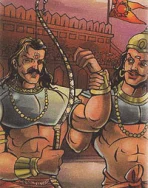
Hearing the conversation, Duryodhana intervened and asked Karna to be calm, as it would be best if Arjuna revealed himself to break the incognito, which would send them back to exile for another thirteen years according to the conditions from the dice game. As usual, Karna listened to his friend and kept quiet. Duryodhana and Dushasana were laughing joyfully that the incognito was going to fail. Bhishma was repeatedly saying the incognito period was ending with the sunset, but Duryodhana was not bothered about it.
On the other side, Brihannala was concerned, but not upset about the laughter he heard in Duryodhana’s army. He merely had to wait until the sun was below the horizon. He continued to persuade prince Uttara to take up his bow and arrows and fight the enemy army. At a particular point, prince Uttara took his bow and shot an arrow, but it fell a few feet from his chariot. The mocking laughter from the enemy army increased, though Bhishma and Drona were worried as they would not fight a eunuch. And if the eunuch were really Arjuna, then he would destroy the whole of Duryodhana’s army.
With the mockery coming from the enemy, prince Uttara jumped out of his chariot and ran towards the forest outside the battlefield. Brihannala followed Uttara and caught up with him in the forest. Brihannala explained to Uttara who he really was and calmed him down. Uttara was not yet convinced, but Brihannala took him to the tree where the Pandavas had hidden their weapons. Brihannala pulled out all his shiny weapons, including the Gandiva, his bow, and Devdutta, his conch.
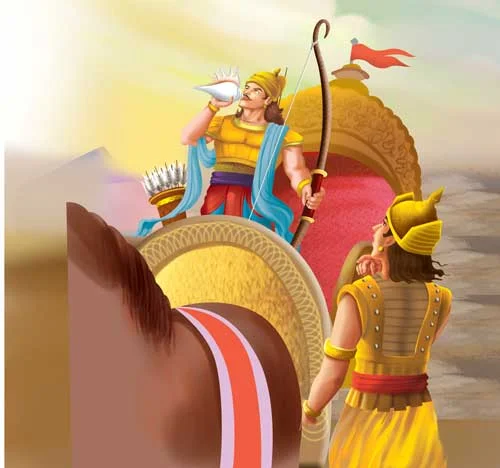
This cleared away all of Uttara’s doubts. He bowed down to Brihannala and requested to excuse him for his behavior. Brihannala asked Uttara to be his charioteer for the coming war with Duryodhana’s army waiting in the battlefield. Uttara whole-heartedly and joyfully agreed. By this time the sun had gone below the horizon. Brihannala took his conch and sounded it, followed by the sound of the Gandiva.
These sounds created a huge commotion in the opposing army. Again, Duryodhana jumped up in joy saying that the Pandavas had broken the incognito condition, as Arjuna has revealed himself. Bhishma and Drona again said that the incognito period was achieved with the sunset. Duryodhana got angry and said that he will not return their share of the kingdom whether the incognito period was successfully completed or not.
Their army was very nervous, as they knew Arjuna would come out with a heap of vengeance. And they were correct. Arjuna in the form of Brihannala, came out firing arrows all around, with Uttara being his charioteer. As Arjuna’s appearance was that of a eunuch, Bhishma and Drona would not take up their bows to fight.
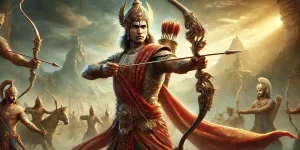
Arjuna noticed that Duryodhana was missing while the others were engaged in the fight. He saw Duryodhana moving the cattle they captured towards Hastinapura. Arjuna shot an arrow, sammohasatra, which made them all faint, so he could pursue Duryodhana and recover the cattle.
Karna was following Duryodhana, so he met with Arjuna in the form of Brihannala. A duel began between them. With the fury Arjuna had, he broke Karna’s bow and made him flee the area. Then Arjuna caught up with Duryodhana, defeated him too, recovered the cattle from him, but Duryodhana escaped.
Leading all the cattle to safety and hiding the weapons under the same tree, Brihannala and Uttara headed back to the palace. At the palace, the Matsya army and the other four Pandavas with King Virata had already returned from the south, victoriously defeating Susharma’s army.
When Uttara went to his father to tell the great news of defeating the Hastinapura army, he found his father in an angry mood and Kanka with a bleeding forehead. Uttara knew something had gone wrong. King Virata was so glad to see his son and congratulated him on his victory.
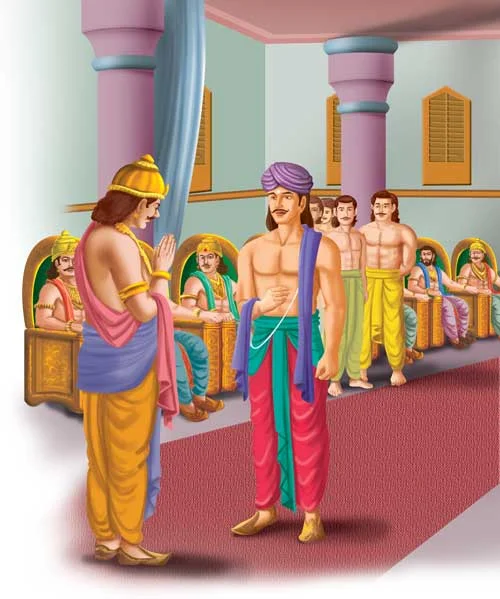
Though Uttara was happy to hear his father’s praise, he was more worried about Kanka’s bleeding. So, he asked his father as to what had happened. King Virata said that Kanka had said that Uttara would be safe because Brihannala was with him. But that made King Virata angry so he flung the dice at Kanka, injuring him. Virata couldn’t understand how Kanka could put Brihannala, a eunuch, above the prince.
Then the King said, “Now tell how you won the war and defeated the Hastinapura army.” Prince Uttara, with a sad voice, said to his father that Kanka was correct, that it was Brihannala who defeated the Hastinapura army. Then he continued, saying they really were the Pandavas, who had been hiding in Matsya kingdom, serving in various ways.
He continued, saying that Kanka was none other than Yudhishthira. Vallabha, Brihannala, Dhamagranthi, and Tantripala were Bhima, Arjuna, Nakula and Sahadeva respectively. And Sairandhri was none other than Draupadi. Hearing this, King Virata got very disturbed and pleaded to Kanka (Yudhishthira) to forgive him for what he did in haste without full knowledge.
More to come…
- Shusharma https://www.craiyon.com/search/Susharma-Chandra%2C-mythical-warrior-king-of-Trigarta-in-royal-armor-on-a-battlefield-with-sunset-backdrop ↩︎
- Susharma Captures King Virata https://www.booksfact.com/puranas/worlds-first-suicide-squad-lead-susarma-mahabharata.html ↩︎
- Villabha, Susharma & Kanka https://www.booksfact.com/puranas/worlds-first-suicide-squad-lead-susarma-mahabharata.html#google_vignette ↩︎
- Karna captures cows & territory https://mymahabharatblog.wordpress.com/2017/10/03/chapter-24-year-of-disguise-matsya-under-attack/ ↩︎
- Karna & Duryodhana https://myhindulife.wordpress.com/2015/03/18/karna-duryodhanas-friendship-or-at-least-what-i-think-of-it/ ↩︎
- Brihannala & Uttara https://www.sawanonlinebookstore.com/defending-matsya/ ↩︎
- Arjuna https://avid-archer.com/arjuna-legendary-archer-indian-mythology/ ↩︎
- King Virata, Prince Uttara & Pandavas https://www.sawanonlinebookstore.com/secrets-revealed/ ↩︎
